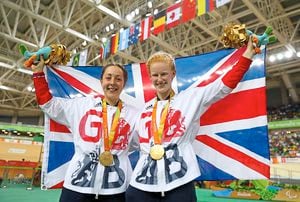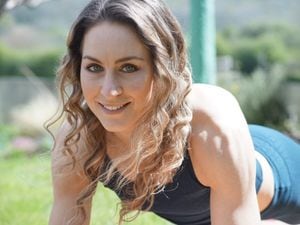Matt Maher: Helen back in quest for Tokyo Paralympics glory
“I’ve been on the GB cycling squad for 12 years,” says Helen Scott. “But in all that time I don’t think I’ve cried as much as I have in the last six months.”
Next week the tears will have all been worth it when Scott goes for glory in her third Paralympic Games.
Every athlete, from every sport, can tell a story of how the Covid-19 pandemic disrupted their plans.
Yet Scott’s is particularly fascinating. At various points during the last 18 months, the 31-year-old Black Country rider admits to having considered her future in the sport. Ultimately, she has emerged from it stronger, with a greater appreciation for her craft.
Back in March last year, of course, everything seemed straightforward. Scott and her tandem partner, Sophie Thornhill, were about to enter their final preparations for a Games then only five months away. The dominant force in the previous three world championships, where they won a total of six gold medals and broke two world records, the duo would have gone to Tokyo overwhelming favourites to at the very least retain their title in the one kilometre time trial.
But the outbreak of the pandemic and the postponement of the Games was followed by an even bigger bombshell, when Thornhill decided to retire.
“Sophie was offered a place on a degree course of Manchester Met University and after a lot of thinking decided she wanted to move on,” explains Scott, from Halesowen.
“I completely understood and supported her decision but at the same time, I was devastated we would not be going to Tokyo as defending champions. I felt like I’d lost a sister, as well as a team-mate.
“When reality starts to sink in you do think: ‘What do I want now? Do I still want to do this? Do I want to go through this process of finding someone new?’
“After reflecting on it I decided yeah, I wasn’t ready to finish yet. I’d worked too hard.”
Yet the GB team now had a unique problem. Namely, how would they find a blind or visually impaired female prepared to sit on the back of a tandem bike and act as ‘stoker’ behind Scott, the sighted pilot, while whizzing round a velodrome at speeds approaching 30mph?
“When Sophie retired, there was no-one in reserve,” explains Scott. “We were starting completely from scratch.”
Scott laughs when it is pointed out the process for finding a new stoker almost sounds like that used by NASA to select astronauts for the early space missions.
And yet there are some similarities, including an almost unprecedented advertising campaign last summer, offering the chance to compete for a Paralympic medal in a little more than a year’s time.
It drew more than 40 applicants, who were then whittled down to 18 for the first in a series of test weekends at the Manchester velodrome last August. Candidates were assessed for their power and endurance, with the three strongest eventually taken to the next stage when they were interviewed and then given the chance to ride with Scott on the track.

“From that point I might as well have set up a bed on the track centre,” jokes Scott. “I was on the track all the time with the three of them.
“I would train with each of them once a week each, plus my own training. It was really difficult.”
Scott describes how other members of the GB team, among them Jason Kenny, would shout encouragement while watching from the sides. The support she received from her colleagues has been genuinely heartening.
And yet this is also top level sport and the intense nature of the process brought its pressures.
“We weren’t just going to pick someone for the sake of it,” says Scott. “We were picking someone to win a medal.
“I lost count of the amount of tears and tantrums I had with various members of the squad who maybe couldn’t quite see what I could.
“When you realise how much you love what you do and don’t want it to end, it becomes a pressure cooker.
“There are discussions, sometimes heated. There have been challenging conversations.
“We’ve come out of it stronger but there were really rough times. There were times I thought it just wasn’t going to happen. There were times when I thought I might have to call it a day.”
Eventually, the hard work paid off. Last month, Aileen McGlynn was confirmed as Scott’s partner for the Games.
McGlynn is not new to the sport, having previously teamed up with Scott to win silver at London 2012 in the kilo event.
Next week will be the first time they have competed together since but while Scott has gone to Japan in search of another medal, the experience of the last 18 months has given her a greater appreciation of the bigger picture.
The recruitment drive which followed Thornhill’s retirement has seen three blind or visually impaired stokers added to the GB development squad.
“I do see things in a different way now,” admits Scott. “It is amazing to think in 12 months we have turned things around and I am going to my third Paralympics.
“It has taken on a whole new meaning. Of course, we don’t go there to just participate. We go there to win medals but this time just getting there is incredible. It has given me the added motivation to go and do my best again.”





